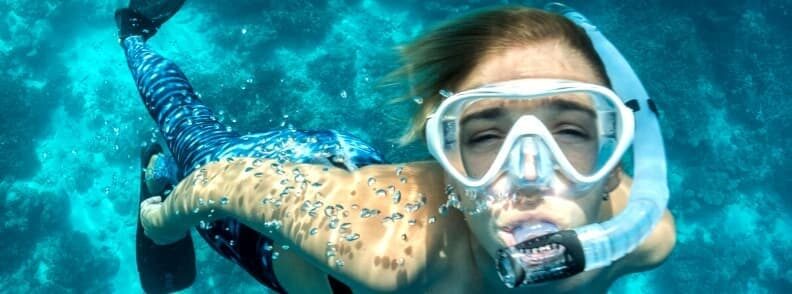Exploring new fields is an essential part of human nature. From ancient times until today, people were motivated to move forward and find out what lies ahead of them. Nowadays, another need is becoming more and more critical: escaping from the day to day routine and revitalizing ourselves.
Snorkeling is an activity that combines all the above. Maybe, that’s why it’s so popular all around the world and keeps attracting newcomers. In any case, there’s always a basic principle: safety comes first.
So, before you begin discovering the underwater beauty, read this article and get ready for an unforgettable experience.
What you should know before going snorkeling
Perfect planning prevents pathetic performance, and the case is not different when it comes to snorkeling. Although it does not have to do with diving deep, which is an activity that requires much more thorough preparation, you still need to feel comfortable in the water.
With the right guidance and supervision, you don’t even need to be a competent swimmer to snorkel. There are, however, some dos and don’ts that you need to know before entering the sea on a snorkeling expedition.
Things snorkelers should do
1. Acquire quality snorkeling gear and put it to practice
There are, necessarily, three snorkeling equipment that you will need to acquire: a mask, a snorkel tube, and fins. They shall fit well, so make sure that you try them before buying. The fins would be much needed, during the first snorkeling sessions, but for the advanced swimmers, they may be unnecessary.
2. Use the buddy system
Because this water sport does not involve diving deep, it is not a prerequisite to practice it with an instructor, although it is highly recommended, especially for the inexperienced. What is strongly recommended is that you always snorkel with buddies. Even the most advanced snorkelers prefer to have buddies around them for both safety and psychological reasons.
3. Protect your skin from the sun
When you are in the water, the sun still affects your skin. Make sure that you always use a sunscreen product to protect your skin. Wet skin sunburns faster, so if you think that water protects you from the sun’s harmful ultraviolet, think again.
4. Be aware of your surroundings at all times
Choosing the best spots for snorkeling tours is very significant. Shallow waters that provide excellent visibility are the best snorkeling spots. At the same time, avoiding places with a strong current is vital, especially for the “rookies”. Waves are not only dangerous, but they can also ruin the whole experience. A shallow beach with rich underwater beauty is probably the best choice for beginners.
5. Bring a wetsuit to keep you warm and safe
Wetsuits are mainly used by more advanced snorkelers, who dive into deeper depths. Nevertheless, having a wetsuit is always useful. Not only because it allows practicing this aquatic sport all times of the year, keeping you warm and safe, but also because it expands your choices. The more capable you become, the more places you will want to visit for snorkeling. Wetsuits provide safety, and the chances are that you will need to have one sooner or later.
What not to do when snorkeling
This underwater sport stimulates a great sense of freedom. Feeling the warmth of seawater and observing underwater life reinforce such feelings by providing a connection to nature. Feeling free, however, does not mean being careless.
1. Don’t bother the marine life
Underwater marine life is beautiful and extremely important for the planet’s balance. Many forms of marine life are, anyway, protected by law, meaning that it is strictly prohibited to endanger the continuity of sea life. You don’t need, though, an imposing law to understand that marine life is precious. So, leave it alone.
2. Do not add too much weight for you to handle
Snorkeling implies being in compliance with the principles of nature. In other words, being simple is a prerequisite when you are in the water. How do you keep it simple? Don’t carry unnecessary things, and don’t add too much weight when free diving. This is, obviously, not just “ideological” advice, but a practical one. You don’t want to make your life in water difficult or, even, put yourself in danger.
3. Never exhale underwater during your snorkeling adventure
Controlling your breath when being in an aquatic environment is an instrumental and quite sophisticated technique for achieving the best results. Here, we will keep things simple and state this: never exhale underwater. Opening your mouth when being underwater will cause discomfort, consume your energy faster, and can even put you in danger.
4. Never dive in without properly fitting your snorkeling mask
The right preparation is a crucial element. Adjusting your equipment properly is fundamental for snorkeling safe and enjoying in full, the whole experience. So, before you put your head underwater, make sure that your mask is fit correctly, and it does not cause discomfort.
5. Do not go diving with fins that don’t fit
Make sure that your fins fit well to your feet. Fins are very useful for new swimmers or people who don’t have too much experience in the water. They help in both floating and moving situations and function as an extension of the human body. Diving with fins that don’t fit can be a real problem, and it is inevitable that it will spoil the snorkeling experience.
Snorkeling is an experience worth living. It’s a unique moment, when you put your head underwater, losing a sense of the outside world and discovering the world that lies beneath. It’s both refreshing and revitalizing, filling your mind with beautiful images of the coral reef or marine life below. Just remember that you should always respect nature. We are all part of nature, and any imbalance we may cause will finally affect all of us. As long as you follow these tips, you’ll enjoy the best snorkeling experiences.

Nikos Vasilellis is the Founder of Nereids Aquatic Coaching and has a passion and love for aquatic activities which is combined with his care for helping others. Nereids Aquatic Coaching helps children and adults overcome their fear of water by focusing on their individual strengths. As a beginner’s guide, he is helping them enjoy the aquatic environment safely.
You too can become a guest blogger on The Travel Bunny. Just submit a free guest post.
Other travel blog articles you should also read on The Travel Bunny
What to do on Maui Island
Vacation in Tanzania: The Pole Pole luxury eco-lodge hotel
Why you should choose a Cancun spring break

